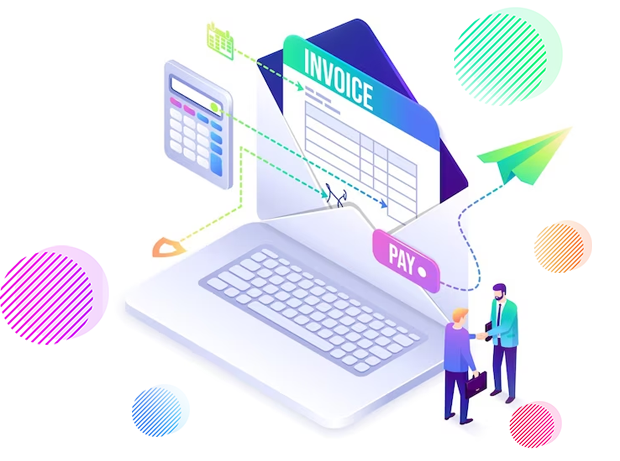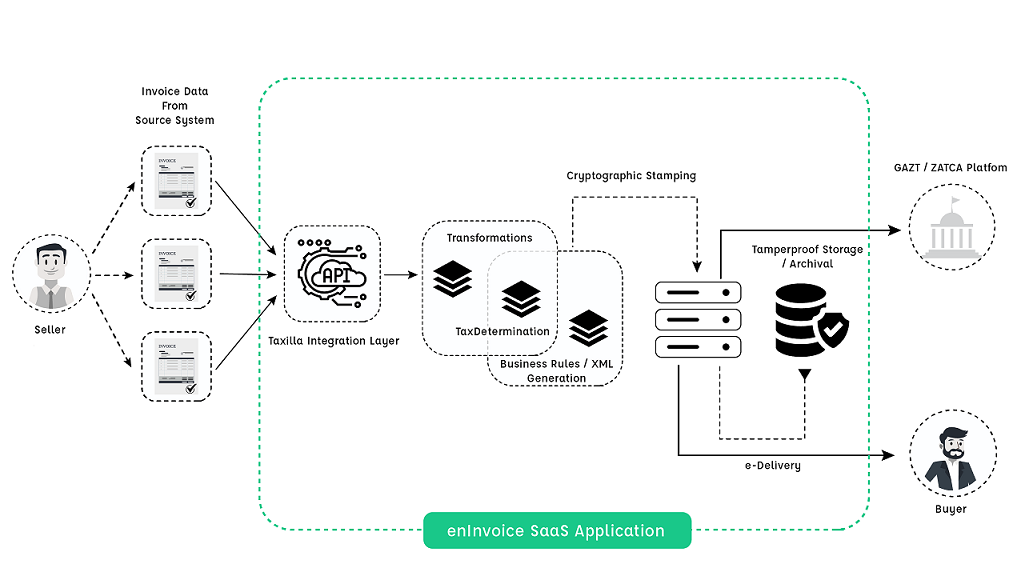- +971 - 557 736 889
- [email protected]








ZATCA is an acronym for Zakat, Tax and Customs Authority. It is the incharge of implementation and administration VAT.It is mandated to implement the E-Invoicing framework in Kingdom of Saudi Arabia (KSA) which was enforced through the E-Invoicing Regulations issued by the Board of Directors of the Authority on December 2020.
Electronic Invoicing is a procedure that aims to convert the issuing of paper invoices as well as credit and debit notes into an electronic process that allows the exchange and processing of invoices, credit and debit notes in a structured electronic format between the buyer
E-Invoicing in KSA is implemented in two phases:
Phase 1: It is also called as generation phase where persons subject to E-Invoicing regulations must generate electronic invoices and associated electronic notes as per ZATCA provided guidelines. This is mandatory from 4th of December 2022.Phase 2: It is also called as Integration phase where persons subject to E-Invoicing regulations must integrate their e-Invoice solution with ZATCA system as per the guidelines provided by ZATCA. This phase will be implemented from 1st of January 2023 in waves and ZATCA will notify the eligible persons atleast six months before the date set for integration”
It is a tax invoice generated in strcutured electronic format (XML) through electronic means
Debit or Credit note generated in structured electronic format (XML) through electonic means
This invoice is issued for most B2B and B2G transactions and will be used by the buyers to claim input VAT deductions. In phase 2 of e-Invoicing electronic tax invoice can be issued to buyers after being cryptographically stamped and cleared by ZATCA
Two types of e-Invoices:
1. Electronic Tax Invoice (Standard Invoice)
2. Simplified Electronic invoice”
This invoice is issued for most B2B and B2G transactions and will be used by the buyers to claim input VAT deductions. In phase 2 of e-Invoicing electronic tax invoice can be issued to buyers after being cryptographically stamped and cleared by ZATCA
This invoice is issued for most B2C transactions and issued to buyer/customer at the point of sale. In phase 2, simplified e-Invoices must be reported to ZATCA within 24 hours of issuance of e-Invoice
E-Invoice generation solution is the software system assigned to a specific location of tax payer to generate a continuous chain of linked e-Invoices and it associated notes in XML format. It also connect to ZATCA using API to submit e-Invoices for reporting/clearance
UUID is acronym for Universal Unique Identifier. It is a 128 bit number generated by chosen algorithm to make it unlikely that same identifier will not be generated by anyone with same algorithm. As per ZATCA guidelines this should be stored in XML invoice though it is not required to display on the invoice pdf
ICV is an acronym for Invoice Counter Value. It is a unique numeric value assigned to the invoice by EGS and will be incremented for each invoice generated. EGS should not provide an option to reset this counter value.
Phase-2 of eInvoice in KSA will be implemented in waves and the eligible tax payers will be communicated 6 months before the enforcement date. Enforcement date for first wave taxpayers is January 1, 2023 and ZATCA has started sending notification to eligible tax payers of wave 1. Taxpayers in the first wave were selected based on the revenue subject to VAT for the year of 2021 exceeding (3 billion) SAR.
Prohibited functions are the actions e-Invoicing generation solution (EGS) must not allow. Below are the list of prohibited functions mandated by ZATCA for each phase. Prohibited functions for Phase 1: o Anonymous access o Ability to operate with default password o Absence of user session management o Allow alteration or deletion of generated e-invoices or their associated notes o Allows for log modification/deletion o Generated with inaccurate timestamps o Non-sequential log generation o Invoice counter reset Prohibited functions for Phase 2: o All Phase 1 prohibited functions o Ability to generate more than one invoice sequence at any given time o Option to export cryptographic stamping key o Allow software time changes o Modification of time stamp value while issuing invoice
A hash is a digital fingerprint of a document obtained using a standardized hashing algorithm to prevent modifying or tampering with the original data. As per ZATCA guidelines SHA-256 algorithm must be used for has generation
CSR is an Acronym for Certificate Signing Request which is generated by E-Invoicing Generation Solution (EGS) using taxpayer details, EGS details & Public Key. This CSR will be submitted to ‘Compliance CSID API’ along with the OTP generated in Fatoora portal by the taxpyer.
CCSID is the Acronym for Compliance Cryptographic Stamp Identifier. CCSID will be issued by ZATCA to EGS & Taxpayer after successfully validating the CSR submitted to ZATCA
PCSID is the Acronym for Production Crytographic Stamp Identifier. PCSID will be issued by ZATCA to EGS & Taxpayer after sucessfully validating the CCSID submitted to ZATCA through ‘Production (Onboarding) CSID API’ and will be used to uniquely identify the EGS solution in pocession of Taxpayer. PCSID is also called as digital certificate. This must be used as Authentication certificate in ‘Clearance API’ & ‘Reporting API’ while submitting e-Invoice to ZATCA
If PCSID is expired, then EGS & Taxpayer must get the new PCSID by using the ‘Production (Renewal) CSID API’ provided by ZATCA.
Yes, Taxpayers can share B2C e-Invoice to customer before submitting to ZATCA . However, the same e-Invoice must be reported to ZATCA within 24 hours of the transaction using ‘Reporting API’ provided by ZATCA. If the e-Invoice is successfully accepted by ZATCA then status will be sent as ‘Reported’
No, Taxpayers cannot share B2B e-Invoice to customer before submitting to ZATCA. Taxpayer has to submit e-Inovoice to ZATCA through ‘Clearance API’. If the invoice is successfully accepted by ZATCA then EGS will receive a status message as ‘Cleared’ , e-Invoice XML which is cryptographically stamped by ZATCA and with modified QR code which includes crytographic stamp of ZATCA. Taxpayer can submit B2B invoice to customer only after it is cleared by ZATCA.
For B2C (simplified) e-Invoices, EGS solution must do cryptographic stamping using the private key generated as part of Onboarading process. For B2B (Standard) e-Invoices, ZATCA will do cryptographic stamping
Yes, Taxpayers can resubmit the rejected invoice as new invoice and must include the previous invoice hash which is generated for the invoice which is submitted immediately before the resubmitted invoice and not that of the invoice generated before the original rejected document
Resubmitting invoice is similar to submitting new invoice and it need not be linked to original rejected invoice.
In case of Simplified Tax Invoices, if the reporting fails, then the taxpayer must correct the error from to prevent it from happening on subsequent documents. The error in rejected document can be rectified and a new document can be submitted for Reporting. As the invoice would have already been issued to customer, there is no need to issue another invoice